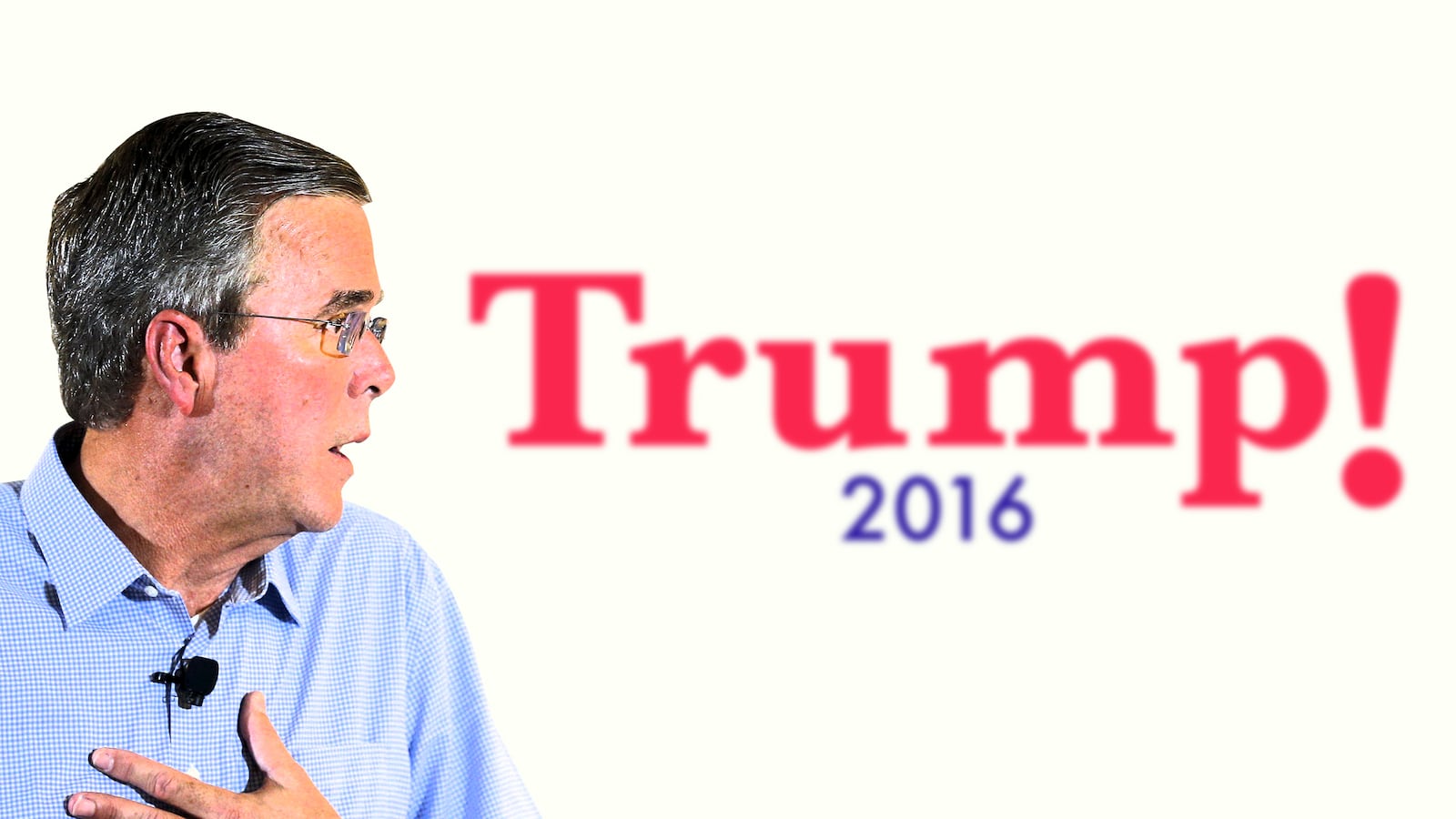When Donald Trump calls Jeb Bush a “low-energy person” whose campaigning lacks spark, a voter might be tempted to think Bush suffers from “Low T,” the mostly made-up malady marketed by the pharmaceutical industry. Whatever Trump’s true intention, the psychological warfare he’s so good at waging had the intended effect, finally provoking a response from Bush, the self-described “joyful tortoise” whose passivity toward his tormentor has been baffling.
“If you’re not totally in agreement with him, you’re an idiot, or stupid, or you don’t have energy or blah blah blah,” Bush said in Spanish at an event in Miami last week. He said Trump attacks him every day with “barbarities,” to which Trump responded with choice tweets.
“It’s the 2016 version of ‘the Wimp Factor,’” says Jack Pitney, a government professor at Claremont McKenna College in California. That’s hitting Jeb where it hurts. When his father announced his presidential candidacy in October 1987 to succeed President Reagan, the cover of Newsweek featured the vice president piloting his yacht with the words, “Fighting The Wimp Factor.”
It was a searing metaphor for the elder Bush’s passivity and his seeming lack of toughness. A decorated World War II veteran whose heroism had never been questioned, Bush’s New England patrician sensibilities had long ago obscured his war record, and eight years as a subservient vice president didn’t help.
The elder Bush went on to win the nomination and to run a campaign second to none in its toughness. He set down a marker that his first-born son followed—George W. embraced the psychological warfare it takes to win—and perhaps now his second-born son will, too.
But for now, Trump is the master. He’s taunting and mocking and belittling the other candidates, and if the other candidates ignore him on the theory they don’t want to feed the beast, he gets covered and they sink in the polls. If they engage him, as Bush has tentatively begun to do, it’s the same phenomenon. He gets covered and they sink in the polls.
“Candidates routinely play with each other’s heads, but no one has been as blatant and brazen as Trump,” says Pitney. He recalls Bob Dole barking to Bush in the ’88 race, “Quit lyin’ about my record,” and Bush needling Republican rival Pete Dupont by calling him “Pierre.” Now, it’s an every day occurrence for Trump to call other candidates “morons” or “idiots” or “losers,” and with rare exception they take the broadsides.
The dynamic is reminiscent of a joke President Reagan used to tell about a guy who seeks help from a psychiatrist because his brother thinks he’s a chicken. How long has this been going on, he’s asked. Fifteen years. Why didn’t you seek help sooner? Because we needed the eggs, he replies.
That sums up the dilemma Republicans face. They need the eggs; they don’t want to offend Trump’s supporters.
Trump has shone a harsh light on the rest of the Republican field, exposing the vapidity and mediocrity of the candidates, who have been touted as this sterling field of current and former governors and senators. None has shown good political chops; they don’t know how to make themselves and their ideas stand out, to the extent they have any beyond the usual sound bites.
“One of the problems is they’re all scared to death he’ll take his marbles and go home,” says Bill Galston, a senior fellow at the Brookings Institution and former domestic policy adviser in the Clinton White House. “An independent Trump candidacy would destroy the Republican Party’s prospects, and they know it. They have no idea where his limits are—if any exist.”
Trump is very good at is negotiating tactics and he’s using the leverage of a potential third-party bid to suppress the full-throated response that many of the candidates would like to voice but don’t dare for fear of what Trump might do. He’s now signed the RNC’s “loyalty pledge,” but not everyone is convinced that a non-binding agreement will ensure Trump doesn’t play the spoiler.
As for what motivates Trump, I turned to Dr. Jerrold Post, founding director of the Political Psychology Program at George Washington University and author of Narcissism and Politics: Dreams of Glory, which was published last year. Post said he was sorry he didn’t have a chapter on Trump, and in keeping with the ethics of his profession, he spoke about narcissists in general, rather than singling out Trump.
Narcissists react to any kind of rivalry and have a very difficult time in sharing the limelight. They are “exquisitely sensitive to slights.” Anyone who vaguely stands up to Trump gets this massive pushback.
“The aspect that is interesting is the ease and sense of mastery—the consummate narcissist believes in his capacity to run the world basically, and conveys such a sense of confidence with such absolutely absurd positions,” says Post. For example, Trump on immigration, what he conveys is, “I am supreme; I am able to do anything, and if I say the Mexican government will pay for this, it will be done.”
Trump’s success in the polls for now has a lot to do with his followers and “the empowerment he provides,” says Post. “He offers something to the person who feels inadequate in himself.” Voters powerless to change a government that is failing them are an easy sell for Trump’s sense of mastery and strength and power.
“You stick with me and I’ll get rid of these people who are using the system,” is the message that Trump conveys. Call it populist, or narcissistic, when it comes to mind games, Trump has not yet met his match.






